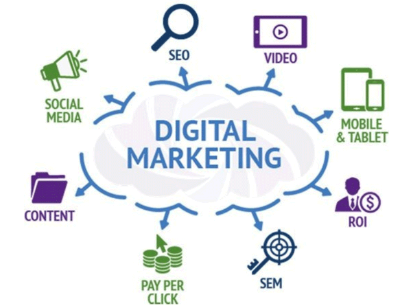
In today’s competitive market, digital marketing has become an essential strategy for businesses of all sizes to connect with their audience and drive growth. Whether you’re running a startup or a well-established business, implementing a comprehensive digital marketing plan can make the difference between obscurity and visibility. In this guide, we’ll dive into the essentials of digital marketing, including strategies that work, the importance of SEO, social media, content marketing, and how to track your success.
What is Digital Marketing?
Digital marketing refers to the use of online channels and digital platforms to promote products or services. It encompasses a broad range of strategies and tactics designed to engage customers, build brand awareness, and ultimately drive conversions. Unlike traditional marketing methods, digital marketing allows businesses to interact with their audience in real time, gain instant feedback, and fine-tune campaigns based on analytics.
Some of the primary digital marketing channels include:
Search Engine Optimization (SEO)
Content Marketing
Social Media Marketing
Email Marketing
Pay-Per-Click (PPC) Advertising
Affiliate Marketing
Each of these channels offers unique advantages, and understanding how to leverage them effectively is crucial for building a successful online presence.
Key Elements of SEO:
Keyword Research: Finding the right keywords that your target audience is searching for.
On-Page Optimization: Ensuring that your website’s content, meta tags, and images are optimized for search engines.
Off-Page SEO: Building high-quality backlinks to your site from reputable sources.
Technical SEO: Improving your website’s architecture and speed to ensure a smooth user experience.
A well-executed SEO strategy can lead to long-term growth, as organic search results tend to have a higher trust factor compared to paid ads. However, SEO is not a quick fix—it requires consistent effort, research, and adaptation to changes in search engine algorithms.
Blogs and Articles: Written content that answers questions, provides solutions, or educates readers.
E-books and Whitepapers: In-depth guides that delve into specific topics.
Videos and Infographics: Visual content that engages users and is easily shareable.
Podcasts: Audio content that allows you to connect with your audience on the go.
Why Content is Key:
Content marketing helps improve SEO, as search engines prioritize websites that offer valuable content. Moreover, quality content keeps users on your site longer, reducing bounce rates and increasing the chances of conversions.
Best Practices for Social Media Marketing:
Define Your Goals: Are you looking to increase brand awareness, generate leads, or drive traffic to your site?
Choose the Right Platforms: Focus on the platforms where your audience is most active.
Create Engaging Content: Use a mix of images, videos, polls, and stories to keep your audience engaged.
Use Analytics: Regularly check your social media metrics to understand what works and what doesn’t.
In addition to organic social media strategies, consider using paid social ads to expand your reach. Platforms like Facebook Ads allow for advanced targeting options, helping you reach your ideal customer with precision.
Advantages of PPC:
Instant Results: Unlike SEO, PPC can drive traffic to your site as soon as the campaign is live.
Targeted Traffic: You can tailor your ads to specific demographics, locations, and even devices.
Measurable ROI: PPC campaigns provide detailed analytics, allowing you to track clicks, conversions, and the cost-effectiveness of your ads.
While PPC can be a powerful tool, it requires careful management to avoid overspending. It’s crucial to continually optimize your campaigns by testing different ad copies, keywords, and targeting strategies.
Key Email Marketing Strategies:
Segmentation: Divide your audience into groups based on behavior, preferences, or demographics to send personalized messages.
Automation: Use tools like Mailchimp or HubSpot to automate welcome emails, cart abandonment follow-ups, and post-purchase messages.
A/B Testing: Experiment with different subject lines, sending times, and email designs to see what works best.
Email marketing also allows for direct communication with your customers, making it an excellent tool for gathering feedback and building relationships.
Important Metrics to Track:
Traffic Sources: Where is your traffic coming from? Organic search, social media, or paid ads?
Conversion Rate: How many visitors are turning into customers?
Bounce Rate: How many visitors leave your site after viewing only one page?
Engagement Rate: Are your social media posts generating likes, comments, and shares?
By regularly reviewing these metrics, you can identify what’s working and what needs improvement, ensuring that your digital marketing efforts are always aligned with your business goals.
Digital marketing is a dynamic and multifaceted field that offers countless opportunities for businesses to grow and succeed. From mastering SEO to crafting engaging content, leveraging social media, and running targeted PPC campaigns, each aspect requires a strategic approach. At WasatchWebsites.net, we specialize in helping businesses navigate the complexities of digital marketing, creating tailored strategies that align with your unique goals. Whether you’re looking to increase brand awareness, generate leads, or drive sales, our team is here to support your journey toward digital success. Contact us today to learn more!
Experience worry‑free WordPress hosting with automatic updates, top‑tier security, and expert support so you can focus on doing what you do best: growing your business.
Take full control of your website on our secure servers with straightforward FTP and control‑panel access—manage your site your way while we ensure uptime and maintenance.
Experience stress‑free domain registration with at‑cost pricing, free privacy protection, built‑in security, automatic renewals, and expert support.
Maximize your ROI and drive high‑quality traffic to your website with expertly managed PPC campaigns.
We’re developing softwares you can use for your business. AI Tools, CRMs, Appointments & Booking, and more.
We’re developing softwares you can use for your business. AI Tools, CRMs, Appointments & Booking, and more.
Generate SEO-optimized content, images, videos, chatbots, code, and voiceovers instantly with our AI Business Tools suite.
Centralize your customer data and accelerate sales with our intuitive CRM that tracks contacts, automates follow‑ups, and delivers insights at a glance.
Delight clients with seamless scheduling—automate bookings, reminders, and confirmations in one easy‑to‑use platform.
Save time and scale your reach with intelligent social media automation that schedules, publishes, and interacts on your behalf 24/7.